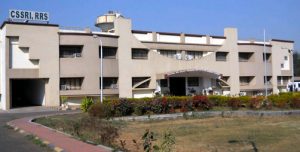
About Centre
Salinity of land and water is a major constraint in our ability to ensure food security. Salinity problems are increasing at an alarming rate, more particularly in the irrigation command areas. About 2.22 Mha of land in Gujarat state alone has already gone out of cultivation due to water logging and salinity. Black cotton soils (Vertisols) due to their inherent physicochemical characteristics such as poor hydraulic conductivity, low infiltration rates, high clay content and narrow workable moisture range pose serious problems for arable farming. Seawater ingress and the marine influence create high salinity situations in the coastal regions. Resource characterization, generating data base on salinity, evolving technically feasible agro-management strategies and their dissemination to the end-users/clients are the vital needs for bringing these problematic soils under production.
Setup
The station started functioning at Bharuch since April 2003 and the Research farm measuring about 23.5 ha at Samni village (Amod taluka) was acquired on lease from the State Government in 2001, with true Vertisols falls at the periphery of Bara tract (21o40´ to 22o13´ N latitude and 72o32´ to 72o55´ E longitude) with salinity problems prevailing at the sub-surface horizons of soil profile. The Station has fully functional laboratory, with facilities for soil, water and plant analyses and research farm for conducting field trials. The Station has been working on evolving technologies for addressing the issues pertained to management of salinity of soils and irrigation waters and also using industrial wastes in agriculture. The mandate of the Station is given below.
Mandate
- To undertake basic and applied research on
- Survey and characterization of salt affected Vertisols and poor quality waters;
- Generating cost-effective technologies for the management of salt affected Vertisols;
- Evolving strategies for efficient use of salty waters for crop production;
- To impart training to the farmers and other user-agencies;
- To provide consultancy in the management of salt affected Vertisols.
Thrust areas
-
Identification and characterization of salt affected Vertisols and associated soils and their management;
-
Use of poor quality waters for crop production;
-
Evaluation of arable crops for salinity and water logging tolerance;
-
Drainage in salt affected Vertisols;
-
Evaluation of non-conventional species and halophytes for Biosaline agriculture
Technology dissemination
The Station since its inception 1989 has come out with the following technological interventions for the management of soils with the problems of inland salinity, coastal salinity and water logging in Gujarat. The major aspects covered include:
Identification of constraint parameters with respect to crop production;
Plan and promote efficient use of land and water resources for maximising crop production in saline environment.
Technology developed
-
Regreening highly saline black soils (ECe > 30 dS m-1) with economic halophytes Cultivation of Salvadora persica on highly saline black soils
-
Cultivation of dill (Anethum graveolens) on saline black soils:
-
Field crops for low to moderate saline soils (ECe, 4-8 dS m-1) –
Conjunctive use of saline water with surface water -
Forage grasses for moderately saline black soils (ECe, 8 – 16 dS m-1)
-
Saline Agriculture with halophytic grasses/ Jatropha curcas
-
Cotton-pulse intercropping for saline Vertisols of the Bara tract
Extension activities
- Developing rainwater harvesting structures in farmers’ fields
- Developing farm ponds at three locations
- Developing Salvadora nursery using saline water
- Biosaline agriculture of forage grasses
- Initiation of studies on farming system mode
-
Participation in the farmers’ meets and addressing the gathering on problems pertained to soil salinity and ways to manage them
Current programmes
-
Integrated farming system studies for maximizing on-farm productivity from saline Vertisols
-
Impact assessment of technological interventions in the Coastal saline areas of Gujarat State
-
Bioremediation and phytoremediation of coastal and inland saline Vertisols by halophilic microbes, fungi and halophytes/salt tolerant species.
-
Improved irrigation, ground water and multiple water use technologies for enhancing water productivity (FPARP II)
-
Screening of cotton accessions for salinity tolerance (RKVY Project)
-
Use of industrial effluent and biological sludge from the Nitro-ETP Plant of GNFC (Consultancy Project)
-
Use of industrial effluent from the Aniline_TDI Plant of GNFC (Consultancy Project)
-
Evaluation of interventions taken up by GSLDC for mitigating salinity in coastal areas of Gujarat (Consultancy Project from GSLDC)


